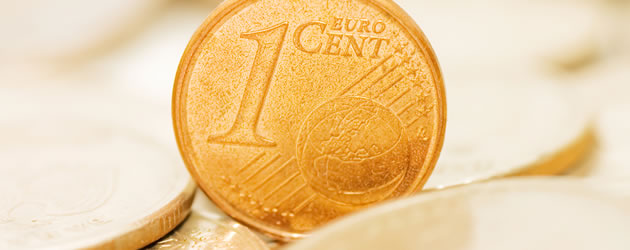The Pound to Euro (GBP/EUR) exchange rate softened on Tuesday as data out of France and Germany came in positively. The single currency was also supported by comments made by European Central Bank (ECB) Executive board member Benoit Coeure who said that the bank would not make hasty decisions when considering introducing new stimulus measures.
On Monday the Pound to Euro (GBP/EUR) exchange rate was trading in the region of 1.26 on speculation that the UK currency will remain supported by comparatively high interest rates. Gains against the Euro were restrained due to data showing that business confidence improved unexpectedly in Germany.
Earlier in the session the common currency generally softened against its major peers. This is as a result of the hangover from European Central Bank President Mario Draghi’s speech last week, in which he reiterated his intention to introduce full blown quantitative easing should it be required.
The Pound, meanwhile, has softened against the majority of its most traded currency rivals as a result of the by-election victory for an anti-European Union political party. Another seat gained by the UK Independence Party has fuelled concerns over the potential Sterling devaluation as a result of leaving the EU.
Earlier…
The Pound Sterling to Euro (GBP/EUR) exchange rate closed out the week trending in a stronger position having rallied from lows of 1.24 to highs of 1.26 in response to developments in both the UK and Eurozone.
Pound Sterling to Euro (GBP/EUR) Exchange Rate Pushes above 1.26, ECB Stimulus Expected
Before the weekend the Pound Sterling to Euro exchange rate advanced by more than 0.8% as investors ditched the common currency after European Central Bank (ECB) President Mario Draghi implied that further stimulus is on the way.
Draghi’s dovish comments, delivered in Frankfurt on Friday, were hardly a surprise given that reports for the Eurozone and its largest economies have failed to impress in recent months.
Concerns regarding the slow-stagnant pace of growth in both France and Germany have led to calls for full-scale quantitative easing from the ECB, but the bank has been reluctant to commit.
The illusions offered by Draghi on Friday, however, were the most decisive to date and it seems that the bank is preparing to purchase government-backed securities.
According to economist Richard Barwell; ‘Mr Draghi argued that the ECB does not have the luxury or the latitude to take many years to bring inflation back where it belongs. That imperative to do what it takes to reflate the economy as soon as possible suggests a more muscular monetary response is brewing.’
Industry expert David Jolly also noted; ‘While Mr. Draghi on Friday did not actually say much that was different from previous utterances, there was a significant new emphasis on the risk of deflation in the Eurozone. He warned that the “inflation situation in the euro area has also become increasingly challenging.” The word “inflation” appeared 45 times in the text of his speech on Friday.’
However, if Draghi fails to make good on his promises, it could spell trouble for the Euro.
Jolly continued; ‘If, after Friday’s statements, Mr. Draghi is unable to announce significant new measures when he and his governing council meet in early December, the financial markets could register their disappointment. Some analysts immediately predicted, though, that Mr. Draghi was simply trying to buy more time. Mr. Draghi will find himself even more on the spot at the December meeting if a closely watched report on eurozone inflation next week shows prices falling further. In the wake of Draghi’s speech, the Euro tumbled across the board and the GBP/EUR exchange rate rallied.’
GBP/EUR Trends Higher Despite UKIP Victory
While the news that anti-EU party UKIP secured its second parliamentary seat triggered a bout of Pound-focused risk aversion towards the close of the week, the GBP/EUR pairing continued trending in a stronger position.
The Pound did fall against rivals like the US Dollar (GBP/USD) and Australian Dollar (GBP/AUD) however as the unexpected victory threatened to change the UK’s political landscape.
As stated by Bloomberg News Agency; ‘Amid speculation UKIP’s growing support will influence government policy on Britain’s ties with its biggest trading partner, Investec Asset Management said it is looking to buy options to sell Sterling. Standard & Poor’s head of sovereign ratings Moritz Kraemer said membership of the EU is an “integral” part of the company’s assessment of Britain, while Societe Generale SA said Sterling may plunge as much as 10 percent if the UK decided to leave the 28-nation bloc.’
This Week’s Pound Sterling to Euro (GBP/EUR) Exchange Rate Forecast
Last week the GBP/EUR exchange rate achieved a high of 1.2648 but even with UK political concerns to contend with, the Pound could test the 1.27 level in the day’s ahead.
There are several high-profile reports for Germany and the Eurozone as a whole to be aware of next week. As negative fundamentals from Germany would increase pressure on the ECB to take immediate action, the Pound Sterling to Euro (GBP/EUR) exchange rate could climb on below-forecast reports.


